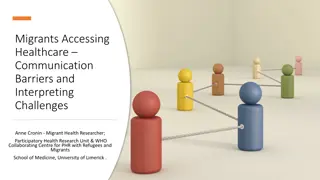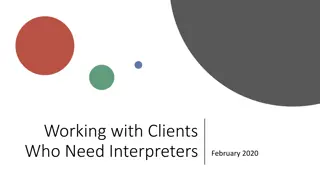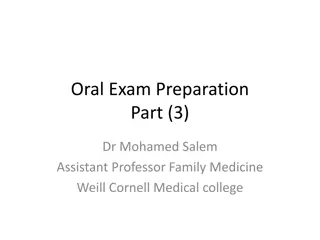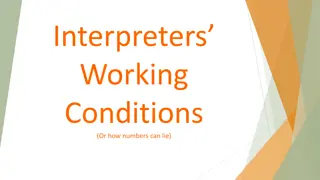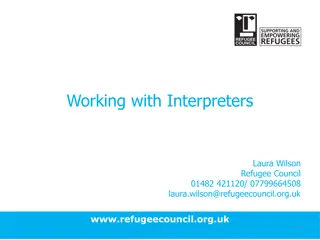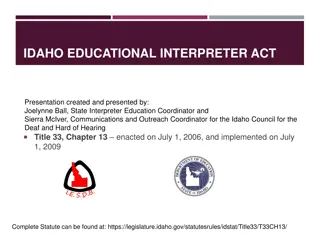Understanding Medical Interpreters: Roles, Ethics, and Practices
Medical interpreters play a crucial role in facilitating cross-cultural communication in healthcare settings. This online training program delves into the responsibilities of medical interpreters, the code of ethics they adhere to, and how to effectively team with them. Learners will gain insights into the importance of accurate interpretation, cultural sensitivity, and ethical practices in healthcare communication. The program highlights the National Code of Ethics for interpreters and emphasizes the need for high-quality standards in the field. By completing this training, participants will be equipped to support the work of medical interpreters and enhance communication with patients of diverse linguistic backgrounds.
Download Presentation

Please find below an Image/Link to download the presentation.
The content on the website is provided AS IS for your information and personal use only. It may not be sold, licensed, or shared on other websites without obtaining consent from the author. Download presentation by click this link. If you encounter any issues during the download, it is possible that the publisher has removed the file from their server.
E N D
Presentation Transcript
Teaming with Medical Interpreters
Objectives Welcome to the "Teaming with Medical Interpreters" online training program. After completing this training, the learner will be able to: Support the roles and responsibilities of medical interpreters. Support the code of ethics expected of a medical interpreter. Outline the principles of how to team with an interpreter.
Teaming with Medical Interpreters This program is made up of the following topics of concentration: Medical Interpretation Code of Ethics Contacting Interpreter Services
Medical Interpretation Interpreters enable the cross-cultural communication necessary in today s health care environment by converting one language into another. However, these language specialists do more than simply interpret words - they relay concepts and ideas between languages. They must thoroughly understand the subject matter in which they work in order to accurately convert information from one language, known as the source language, into another, the target language. In addition, they must be sensitive to the cultures associated with their languages of expertise. Communication assistance should be provided for those patients and families who require foreign language interpretation and for those who are hearing impaired. These services are provided at no cost to the patient.
Medical Interpreter Job Responsibilities Medical Interpreters primary function is to facilitate communication between patients with limited English proficiency (LEP) and their physicians, nurses, lab technicians, and other health care providers. An interpreter s role with a patient in order of priority is: 1. Conduit 2. Clarifier 3. Culture Mediator Least Invasive 4. Advocate Most Invasive
Teaming with Medical Interpreters As the profession of health care interpreting has matured and evolved, the importance of creating shared understandings of what is considered high quality and ethically appropriate principles and practices in the field become imperative. The National Council on Interpreting in Health Care has established a set of accepted standards as the National Code of Ethics. The code provides guidance when making judgments about the right actions to take when faced with a difficult decision. The Code of Ethics represents the principles that working interpreters believe are important to ensure the ethical practice of their profession. These principles are the ones that working interpreters have said merit serious consideration when faced with a dilemma or difficult choice and to which they agree to be held accountable.
Code of Ethics for Interpreters in Health Care The interpreter treats as confidential, within the healthcare team, all information learned in the performance of their professional duties, while observing relevant requirements regarding disclosure. The interpreter strives to render the message accurately, conveying the content and spirit of the original message, taking into consideration its cultural context. The interpreter strives to maintain impartiality and refrains from counseling, advising or projecting personal biases or beliefs. The interpreter maintains the boundaries of the professional role, refraining from personal involvement. The interpreter continuously strives to develop awareness of his/her own and other (including biomedical) cultures encountered in the performance of their professional duties. http://www.ncihic.org
Code of Ethics for Interpreters in Health Care (Continued) The interpreter treats all parties with respect. The interpreter strives to continually further his/her knowledge and skills. When the patient s health, well-being, or dignity is at risk, the interpreter may be justified in acting as an advocate. Advocacy is understood as an action taken on behalf of an individual that goes beyond facilitating communication, with the intention of supporting good health outcomes. Advocacy must only be undertaken after careful and thoughtful analysis of the situation and if other less intrusive actions have not resolved the problem. The interpreter must at all times act in a professional and ethical manner.
Teaming with Medical Interpreters Speak directly to the patient, in the first person. Trained interpreters will also speak in the first person as if he or she was the patient or provider. Pause every 3 to 4 sentences for interpreter to interpret. Staff or contracted interpreters wait outside the exam room when clinic staff and providers are away from the room. All information shared in the room is confidential. Interpreter must repeat everything that is being said in front of the patient or provider. If you have information to be shared with the interpreter only, please wait to do so when interpreter is alone. For forms like consents for treatment, surgeries, procedures, etc., a provider or clinic staff must be present to explain form and signature.
Remote Interpreting When an in-person staff interpreter is not available, it will be necessary to team with an interpreter by phone or by video. Teaming with a staff interpreter in these formats is easy by following the guidelines set out earlier in this section. Being sure only one person speaks at a time will help ensure accurate interpretation.
Working with Deaf Patients Special considerations should be made when working with a deaf patient. The Americans with Disabilities Act requires accurate, effective, and impartial communication with any deaf or hard of hearing patient. In order to comply, ask the patient for their preferred method of communication: a qualified interpreter (defined as either in person or via video) handwritten notes lip-reading or a combination of the above
Contacting Interpreter Services It is the policy of Security Health Plan to provide equal opportunity in all programs and services to persons with limited English proficiency. Limited English Proficiency (LEP) persons are persons who cannot: speak read write or understand the English language at a level that permits them to interact effectively with physicians and staff. As soon as you become aware you will be serving an LEP patient, please contact Interpreter Services. To schedule an interpreter, contact your facility s interpreter services.
Contacting Interpreter Services For Security Health Plan providers with patients that require language assistance, the telephone Language Line is provided free of charge. This line is intended for our contracted providers who do not have access to interpretation services and need to interact with Security Health Plan members who have Limited English proficiency. for
Contacting Interpreter Services IMPORTANT INFORMATION: WORKING WITH AN INTERPRETER - At the beginning of the call, interpreters identify themselves by name and ID number. Note, this information for reference. Then tell the interpreter the nature of the call. Speak directly to the limited English proficient or Deaf or Hard of Hearing individual, not to the interpreter, pausing at the end of a complete thought. To ensure accuracy, your interpreter may ask for clarification or repetition. 3-WAY CALL - INITIATING/RECEIVING A CALL Use the conference feature on your phone and follow the instructions provided to connect to an interpreter. If you are initiating the call, get the interpreter on the line first, then call the limited English proficient individual if you are receiving a call, ask the caller to 'Please Hold.' and then conference in the interpreter
Contacting Interpreter Services IMPORTANT INFORMATION Continued: PHONE INTERPRETING EQUIPMENT If you have interpreting equipment, use one handset to call into language line, once connected to the interpreter, the second handset to the limited English proficient individual. CUSTOMER SERVICE - To provide feedback, commend an interpreter, or report any service concerns, visit www.languageline. com and click on the Client Resources tab, scroll to Voice of the Customer and complete the form. LEARN MORE Visit www.languageline.com or call 1-800-752-6096 for more information on our language access solutions.













